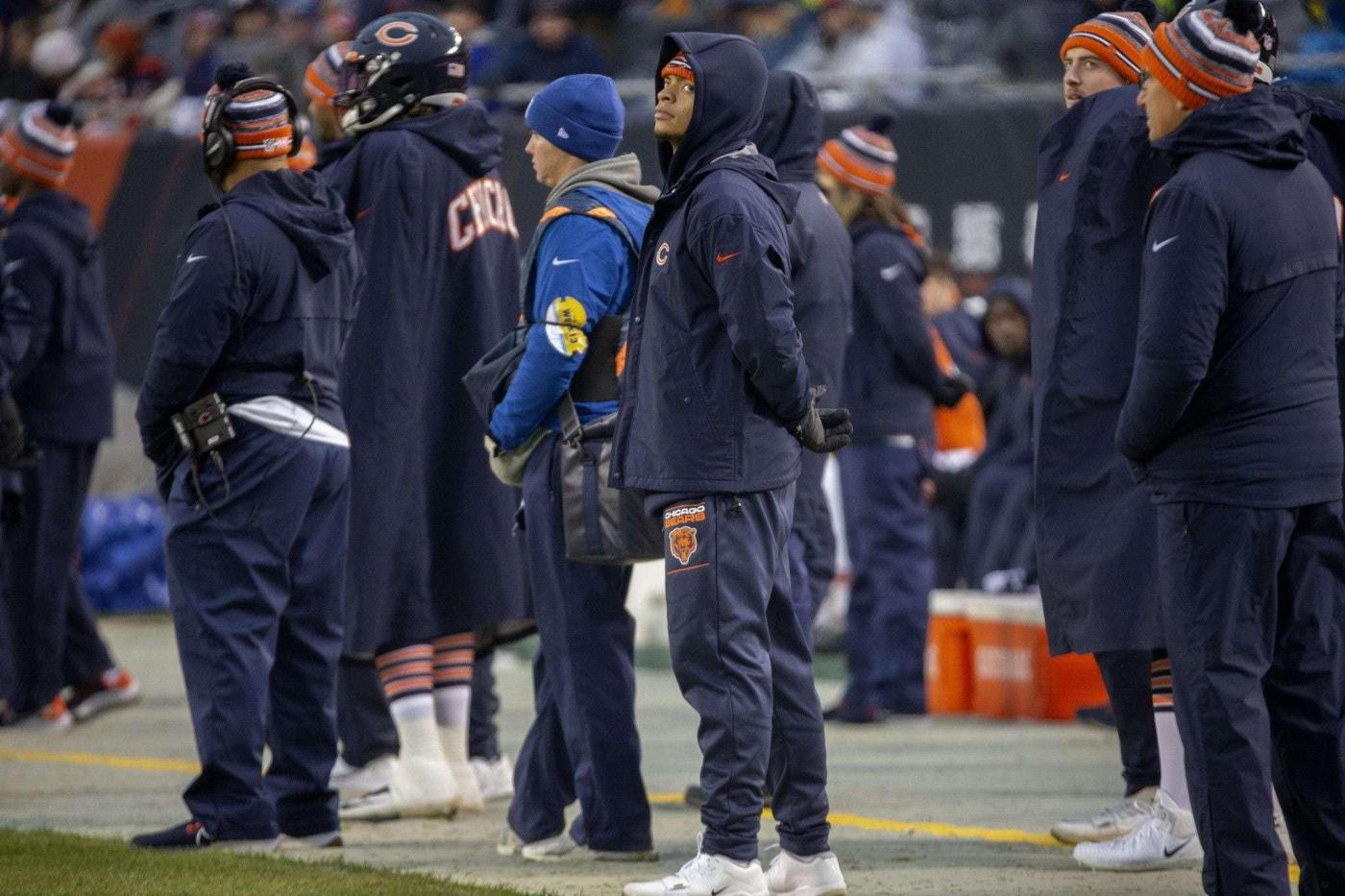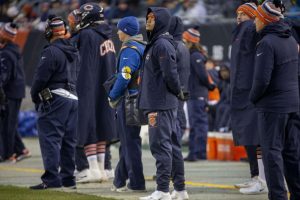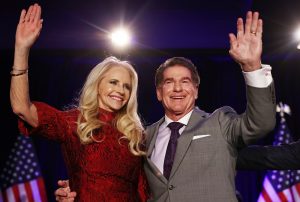
Chicago Bears Q&A: Could Tyson Bagent be the QB of the future? Any chance they would draft Brock Bowers?
The Chicago Bears have a new offensive coordinator, announcing the hiring Tuesday of former Seattle Seahawks coordinator Shane Waldron.
With that question answered, attention focuses even more on what the team will do at quarterback. And not surprisingly, QB questions dominate this week’s edition of Brad Biggs’ Bears mailbag.
Part of me thinks Shane Waldron is a great hire because of how Geno Smith went from castoff to enjoying a rejuvenated career. But the skeptic in me says maybe Dave Canales was behind Smith coming on and the Seahawks offense was middling despite great WRs/RBs. What do you think of the hire? — @tn5280
How the Bears will look under Waldron is one of the biggest questions surrounding the Bears. We’ll need more information and a better idea of what the roster looks like in the spring to really dive into this. As you know, a coordinator can be only as good as the parts he has to work with. I called a veteran pro scout for his take on Waldron and the work he did in Seattle over the last three seasons.
“Sean McVay is the best play caller in the NFL right now, and Waldron’s system is going to be a direct reflection of that scheme,” the scout said. “In Seattle, they did open up the offense for Geno, and Shane worked for a head coach (Pete Carroll) that would pressure him to run the ball consistently. Waldron is a good play caller. You can wonder if he worked for a head coach that didn’t allow him to really open it up. Is he going to encounter the same thing with Matt Eberflus, another defensive head coach? Maybe.
“The run game is at the foundation of what McVay does. It creates a lot of formational variance, there’s a lot of misdirection and motion and all of that builds out to the passing game. McVay has transitioned to more of a gap scheme running the ball. (Waldron is) going to need athletic linemen, and the Bears have some of those.”
A lot of folks are wondering how Waldron’s offense will differ from what the Bears did under Luke Getsy, who had similar roots. It’s possible there could be more pre-snap movement, but we won’t know that for a while. The Seahawks really struggled to run the ball this season, but a lot of that can be attributed to a rash of injuries on the offensive line.
There has been intense focus on the scheme and X’s and O’s and play calling and how all of that will fit. That’s a huge part of the job. What also cannot be overlooked is how Waldron commands the room. How he presents information to players. How he connects with players. He essentially will be the head coach of the offense, and a lot more goes into the job than a game plan and play calls. There’s a lot to learn about Waldron and a ton of ground for the Bears to cover in terms of roster decisions.
Why are you not giving more consideration to the possibility Ryan Poles decides to trade down from No. 1 and build the roster around Justin Fields, who would then have another season or two to prove himself? He’d be in position with additional draft capital to get a quarterback in the future if Fields didn’t become the right guy. — Jordan M., Fishers, Ind.
It would be foolish to rule out any possibility at this early juncture, but I don’t think the odds of your scenario happening are very high. The Bears are in the unusual position of owning the No. 1 pick for the second consecutive year, and they’ve had rocky quarterback play — for a lot of reasons — for more than two years in a row. There’s no telling what kind of draft capital Poles would have in the future if he trades down.
When the Bears traded the No. 1 pick last year, it was the 13th time the top pick had been traded since 1967. Only two of those previous deals involved a future first-round pick.
In 2016, the St. Louis Rams traded up to No. 1 with the Tennessee Titans to select quarterback Jared Goff. The Titans wound up with the fifth pick in 2017 coming back from the Rams and used it on wide receiver Corey Davis.
In 1990, the Indianapolis Colts traded up to No. 1 with the Atlanta Falcons to select quarterback Jeff George. The Falcons wound up with the 13th pick in 1991 coming back from the Colts and used it on wide receiver Mike Pritchard.
If the Bears trade down from No. 1, there’s no way of knowing how valuable the pick(s) they would get back will be. The chances of them landing the No. 1 pick again wouldn’t be very good. For the sake of discussion, let’s say in a trade-down scenario, Poles nets the No. 4 pick in 2025. If there is one elite quarterback in that class, good luck being able to move up and get that player.
When quarterback is an issue and you’re in position to address the issue, I think you have to take action. I believe that is what the Bears will do.
After watching two weekends of playoff football, the passing plays and route designs are far more creative than what we saw from the Bears. Is it the offensive coordinator and play calling, the WR corps or just a plain talent disparity? — Ron M., DeKalb, Ill.
The route concepts you have seen in the playoffs are very similar to what the Bears did with Luke Getsy and really what every offense runs. There are only so many ways you can skin the cat, and the only real differences are in formations, pre-snap movement — and, of course, skill-position talent.
What you’ve seen throughout the playoffs is more talented pocket throwers than what the Bears have had for a long stretch, predating the Justin Fields era. C.J. Stroud, Patrick Mahomes, Jordan Love, Josh Allen, Brock Purdy, Jared Goff and Lamar Jackson are all highly skilled throwing from the pocket and on time. Most of the throws Jackson made Saturday, with the exception of the pass off the quarterback sweep, were from the pocket.
That’s what you haven’t seen with a high level of consistency from the Bears. That’s what looks different.
I’m confused by the argument that resetting the QB clock — saving $30 million for three years — is more cost effective than trading down and continuing with Justin Fields. That amount will get you maybe two or three impact players for the three years of savings, right? Meanwhile, a trade like the one last year will net about four additional first/second-round draft choices on four- or five-year rookie contracts. Even with having to pay Fields in Year 3, that strikes me as more cost effective and consistent with the “build-through-the-draft” mantra. Conceding that you’ll probably upgrade the QB position using the first pick, at what cost to other positions? Your thoughts? — Glen H.
My reaction is that the whole idea of resetting the quarterback clock by drafting one to replace Fields, who has played three seasons, is only a minor part of the evaluation for the Bears. This would be an added benefit but only if the Bears wind up with the right quarterback.
The bottom line is that the Bears have had inadequate quarterback play, and if you’ve watched the playoffs even casually, you’ve seen that the remaining teams are getting high-level play at the position. It’s nearly impossible to be a consistent contender and have sustained success if you don’t get it right at quarterback.
With average quarterback play — and the Bears have had below-average play — nearly everything else needs to be elite to have a chance to make a postseason run. The Bears are in position with the first and ninth draft picks to select a new quarterback and change the trajectory of their offense. The financial ramifications of a rookie quarterback in the first year of his contract is only a small part of the equation.
The question the Bears have to ask themselves is would adding more talent through a trade down raise Fields’ play to a level that leads to sustained success. That’s possible, and Fields’ supporters certainly would push this thinking. The Bears would have to hit on those picks too.
There are so many ways to examine this scenario. I keep circling back to the fact Fields has had three years as the starter and hasn’t been good enough on a consistent basis, and here the Bears are with the No. 1 pick in what looks like a pretty darn good year to be sitting at the top of the draft if you need a quarterback. It’s really not complicated.
I’m sure there are many who are curious if Tyson Bagent could be the future quarterback. How about keeping Justin Fields next year, trading down and reevaluating things after 2024? — Joe H., Palos Park
Bagent’s development as an undrafted rookie and the fact he beat out P.J. Walker for a roster spot and then went 2-2 as the starter was a terrific story. I think Bagent has the ability to stick in the league for many years. He’s wired to succeed and the moment wasn’t too big for him in spots where we’ve seen quarterbacks with a lot more seasoning fall on their faces.
Bagent needs more time, though, and I don’t think what we saw screamed “future franchise quarterback.” The team won’t put a ceiling on his development, but it would be beyond risky to bet on Bagent for the future and use that as a rationalization to keep Fields.
You mentioned that it will not be possible to retain Justin Fields while taking a quarterback with the first pick, and the reasoning you provided makes sense to me. What is the possibility of picking up Fields’ fifth-year option and building weapons around him, and draft J.J. McCarthy late first round or in the second round? This will give Fields enough time to prove himself while McCarthy develops. This will not disrupt locker-room dynamics, and McCarthy has shown great leadership, maturity and key plays to help win the national championship. — Karthik J., Peoria
It’s possible the Bears could use the first pick on a quarterback and retain Fields. It’s my opinion they won’t choose that avenue. I don’t think the Bears are inclined to exercise the fifth-year option for 2025 in Fields’ contract because he hasn’t played well enough over three seasons for that to be a viable consideration.
There’s a decent chance McCarthy will be drafted in the top half of the first round. I’d be surprised if he lasted into Round 2, but we do see quarterbacks fall on occasion. I don’t believe the Bears would disrupt the locker room if they draft a quarterback and move on from Fields. You know what players will do if the team drafts a quarterback? Support the new guy. That’s what good teammates do. They have their quarterback’s back.
With Cole Kmet under contract for the foreseeable future and Robert Tonyan and Marcedes Lewis low-usage guys this year, is there any chance the Bears would draft Brock Bowers if he falls to them? — Mike F., Chicago
Bowers is an interesting prospect and a highly skilled tight end. The Bears would have to desire to use a ton of two-tight-end formations if they invested in Bowers. It’s more likely they would select a wide receiver as they don’t have a No. 2 opposite DJ Moore under contract right now and they probably want to create some competition for Tyler Scott for the No. 3 role.
Why is a Justin Fields trade only worth a Round 2 pick when there are so many QB-needy teams and the potential is clearly there for him to develop into something special? — @opinion4you
I don’t think anyone knows specifically what Fields would command in a trade. I’ve written that I highly doubt the Bears could get a first-round pick in return. It’s possible they could get a second-rounder, or the best offer could be a third-round pick and change or maybe a third-rounder with conditions that could improve to a second. Who knows?
The more teams potentially involved, the more negotiating power the Bears would have. Fields’ value is limited by his performance in 38 career starts and the fact he’s currently under contract for only one more season with an option for 2025. His value also would be limited if teams believe the Bears are definitely going to select a quarterback in the first round. That’s one reason I expect GM Ryan Poles to play poker for a while as he sorts through the multitude of options.
I have heard many experts say Justin Fields does not make quick enough decisions in the pocket, which leads to sacks or chunk plays that don’t materialize. I have heard that Caleb Williams will step up in the pocket and under pressure will deliver positive plays without holding on to the ball too long. Of course both can scramble when necessary. Can coaches compare what Williams does against inferior college-level talent and compare that to what Fields does in the NFL? — Ed S., Auburn, Ala.
That’s an interesting question. One of the knocks on Williams, especially this past season, was that he also had a propensity to hold the ball too long waiting for something to materialize.
I don’t know that the Bears are comparing Fields and Williams side by side. They need to complete an exhaustive review of Fields and determine what they believe his career arc to be heading into Year 4. Then they need to thoroughly study the quarterbacks in this draft class — Williams and all of the others — and project those players’ floors and ceilings. After that, they can get an idea of what the best direction would be, whether that means keeping Fields, keeping Fields and drafting a quarterback or drafting a quarterback and moving on from Fields.
They’re in an enviable position with the first and ninth picks and they control the market. When evaluating Williams (and really all of the quarterbacks), it’s a projection to determine how they would fare in the NFL after playing against college defenses. It’s also a projection when considering the players they had surrounding them. Williams didn’t have a lot around him this past season. USC had a poor offensive line and not a lot of skill talent on the outside.
If the Bears and White Sox are both looking for new stadiums, what is the chance that they would end up sharing one? — Dave, San Diego
The Oakland Coliseum, when it was home to the Raiders of the NFL and Athletics of MLB, was the last multiuse stadium. Those days are gone and I don’t see them returning in the near future. Teams desire stadiums that are designed specifically for their sport. I’d put the chances of the Bears and Sox calling the same building home at zero.
()


